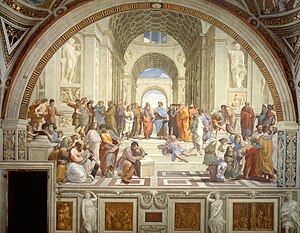哲學家
哲學研究者
(重定向自哲学家)
哲學家(英語:Philosopher),智慧的愛好者(lover of wisdom),對事物懷抱興趣,擁有廣泛的知識,並且能夠利用這些知識來解決特定的問題。

在古代,哲學家是遵循特定生活之道的人,集中精力在回答人類境況的生命問題(existential questions)。根據公元二世紀基督教神學家亞歷山大城的革利免之陳述[1]:
因此,哲學──作為一種有最高效用的事物──古時候就在外地人之中繁盛,向列國揭露其智慧的光芒,並在之後來到了希臘。它首先降臨在埃及人的先知(Prophet)之中,亦顯現於亞述人的迦勒底占星師(Chaldean)[2],高盧人的德魯伊(Druid),巴克特里亞人的沙門(Śramaṇa ),凱爾特人的智者(指德魯伊),以及波斯人的術士(Magi)──他們預先宣告了救世主的誕生,受星辰指引到達猶地亞之地。並且也出現在印度人的赤裸苦行僧(Gymnosophist ),和其他外邦國家的哲人們當中。在印度苦行者中有兩類群體,有些人被稱作沙門,其他人則是婆羅門(Brāhmaṇa)。
在現代,哲學家是指貢獻於一個或多個哲學分支領域的知識份子,包括美學、倫理學、知識論、科學哲學、邏輯、形上學、社會理論、宗教哲學以及政治哲學。哲學家未必只研究哲學,也可能跨足至從哲學分離出去的人文學科和科學領域。
参见 编辑
- ^ Clement Clement of Alexandria "The Stromata, or Miscellanies" Book I, Chapter XV (页面存档备份,存于互联网档案馆)
- ^ Viglas, Katelis. Chaldean and Neo-Platonic Theology. Philosophia E-Journal of Philosophy and Culture. 2016, (14): 171–189 [2021-06-10]. (原始内容存档于2021-06-09).
The name Chaldeans refers generally to the Chaldean people who lived in the land of Babylonia, and especially to the Chaldean magi of Babylon......The Chaldeans were the guardians of the sacred science: the astrological knowledge and the divination mixed with religion and magic. They were considered the last representatives of the Babylonian sages......In Classical Antiquity, the name Chaldeans primarily stood for the priests of the Babylonian temples. In Hellenistic times, the term Chaldeos was synonymous with the words mathematician and astrologer.